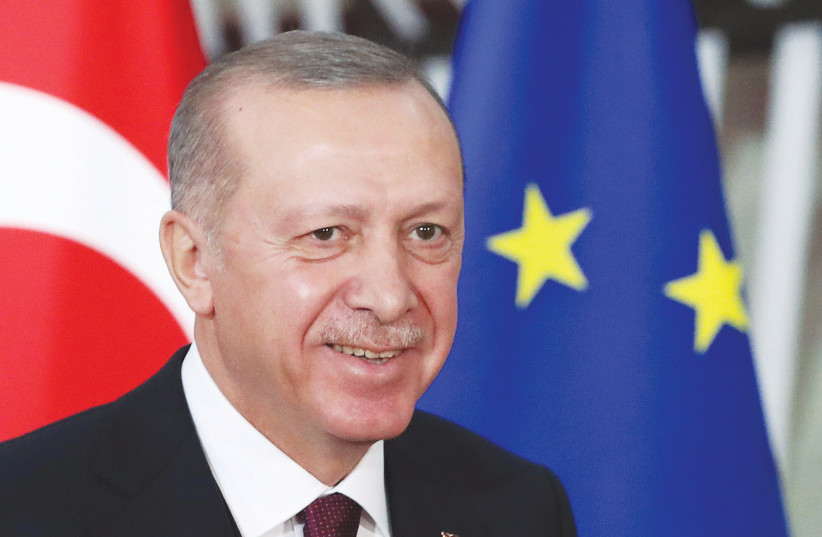How to push back Turkey’s EU provocation – opinion
TURKISH PRESIDENT Recep Tayyip Erdogan arrives for a meeting in Brussels in March.
(photo credit: YVES HERMAN / REUTERS)
In a telling move, French Minister of State for European Affairs Clément Beaune recently brought up possible economic sanctions targeting certain sectors the European Union would impose on Turkey on account of its hostile actions on the fringes of Europe.The minister pointed out sanctions as a “possibility.” Yet it might be too little, too late.In late October, the European Union castigated Ankara’s provocations as “totally unacceptable.” However, decision-makers agreed to postpone any decision on sanctions against Turkey until the EU summit in December.The carryover suggests there remain European differences that stand in the way of a firm stance against Turkish harassment, despite a general agreement on condemning Turkey’s “provocations and systematic aggression” at European borders.Previously, the EU had adopted a tougher attitude toward major powers, such as Russia. But the sensitivity of relations with Turkey makes this attitude understandable. Turkey is holding the EU ransom over refugees and other issues, such as NATO membership. Brussels is reluctant to impose sanctions on a strategic partner as the implications could involve a scenario of freezing, if not breaking up, the alliance.Furthermore, Europe sees the time factor and the strategic setting whereby all economies are facing the coronavirus pandemic as particularly sensitive. As such, it is difficult to make political decisions on economic and trade sanctions or suspensions.That is why the French minister made a point of saying that possible sanctions against Turkey may be individual or partial and may affect particular sectors of the Turkish economy, but will not go as far as to end the EU-Turkey customs union.One problem is that Sultan Erdogan does not perceive European patience with a conscious political vision. He sees it as a sign of weakness and pursues his provocation. Proof of this is his visit to Turkish-controlled Northern Cyprus, following a European warning issued late last month, which the French minister described as an opportunity given to Turkey at the last European summit after the sultan sent what were billed as “small signs” of appeasement.The sultan has been hammering away at European strategic interests ever since all faith was lost on Turkey’s bid to join the EU. His latest provocation to date came with his call for a boycott of French products in Turkey and the Muslim world, against the backdrop of offensive caricatures of the Prophet (peace be upon him), in a spirit of populist propaganda divorced from his due role as political leader. Erdogan hopes to gain popular support to offset his waning popularity at home and divert attention from the nosediving Turkish lira.Beaune thinks the truth about Erdogan is obvious to all European countries after his brute intervention in the Nagorno-Karabakh conflict, in support of Azerbaijan against Armenia. “Today no European country has any illusions about who Mr. Erdogan and his regime are.” The outcome of the next European summit will serve to verify this point.Europe must be clear that the downward slide of the Turkish sultan’s regime into economic doldrums will get him to make more provocations over the coming period, unless there is a firm European standpoint to put them off.Its record currency decline should prompt Turkey to ramp up military adventures, although sensibly, the sultan should immediately stop foreign intervention as the only way to save his country’s economy.






.jpeg)
Comments
Post a Comment